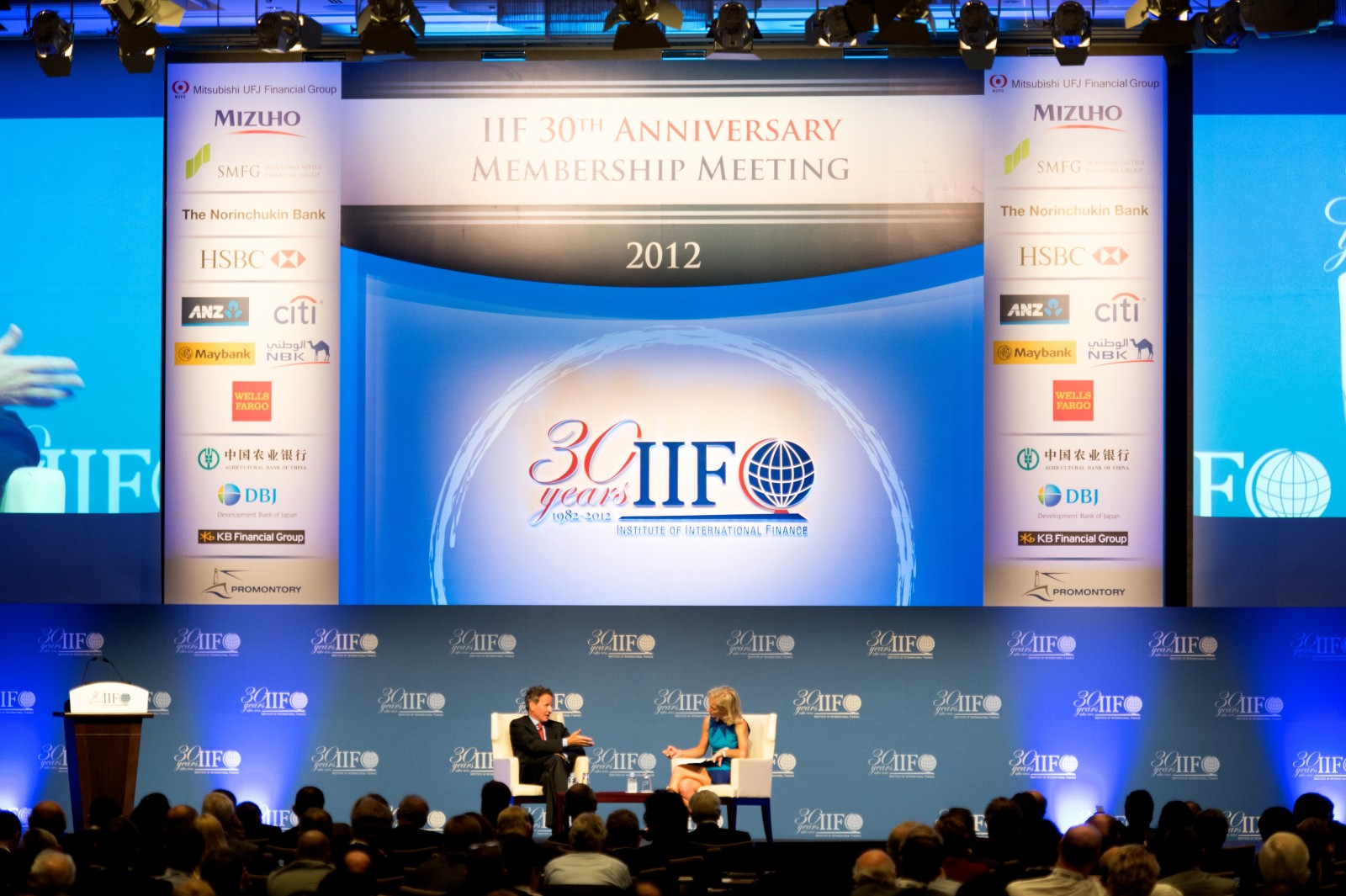
In Part 1 of the Global Power Project exposé on the Institute of International Finance, I examined the origins and evolution of an organization representing the interests of global banks. In Part 2, I looked at the role played by the IIF and its leadership during the European debt crisis. In this third and final part in the series, I examine the relationship between the IIF and global central bankers.
Since the early 1990s, the IIF has been heavily involved working with central bankers, particularly through the Bank for International Settlements (BIS) in Basel, Switzerland, where private bankers have been granted a powerful position determining their own regulations in international financial markets. The IIF has been central throughout the reform of Basel I and the entire process of both Basel II and Basel III – collectively known as the Basel Accords – which were officially organized through the Basel Committee on Banking Supervision (BCBS), run out of the BIS.
From 1999 to 2004, the Basel Committee organized to impose a new set of global banking regulations, called Basel II. The head of the Basel Committee at the time was William McDonough, then the president of the Federal Reserve Bank of New York and a former Vice Chairman at the First National Bank of Chicago. He was also a founding member of the IIF at the 1982 Ditchley Conference, and remained a member on the board of the IIF from 1984 until 1990.
McDonough later explained: “Without the IIF it would have been far more difficult for regulators, such as the Basel Committee, to fully understand the critical issues that confronted the banks. The meetings with the IIF were an excellent sounding board – we trusted them (the banks) and they trusted us (the regulators)."
At the start of the Basel II process in 1999, the IIF created a special group, the Steering Committee on Regulatory Capital, which was to engage with the Basel Committee on behalf of the global banking industry. The papers put forward by the Steering Committee were ultimately accepted and implemented by the Basel Committee in the final accord, Basel II, essentially allowing the banks to regulate themselves.
The Chair of the Steering Committee, Daniel Bouton, who was also chairman and CEO of the French bank, Société Générale, later commented that, “It was of the utmost importance to try to have a coordinated view of the global banking industry in order to be able to discuss with the Basel Committee the most important questions. In fact, the IIF has been the single platform to forge a consensus between global banks about the key principles. And so it has played a very important part in discussions with the Basel Committee.”
But the relationship between the IIF and central bankers goes beyond the timid attempts at “regulation” on the part of global central banks. In fact, central bankers traverse through the revolving door of financial markets: from the mega-banks into the central banks.
At the mega-banks, the bankers' job is to maximize profits through financial markets. At central banks, their job is to protect the banks through management of financial markets. It is a relationship of mutual interest, each side in need of the other, and together, with unprecedented power, central bankers and the "too-big-to-fail" mega-banks have become financial institutions that dominate the global economy.
Indeed, the Institute of International Finance has a number of boards which meet regularly that include several central bank chiefs. Notably, there is the IIF’s Group of Trustees of the Principles, with four co-chairs. One of the co-chairs is Agustin Guillermo Carstens, the Governor of the Bank of Mexico, who also sits on the board of directors of the Bank for International Settlements. In addition he is a member of the Steering Committee of the G20 Financial Stability Board (FSB), a group of central bank chiefs and finance ministers from the G20 nations who meet alongside leaders of the BIS, European Central Bank, European Commission, IMF, World Bank and the OECD to determine the world’s response to the recent global financial and economic crises.
The other co-chairs of the IIF’s Group of Trustees include: Christian Noyer, the Governor of the Bank of France (from 2003 to the present) and chairman of the Bank for International Settlements (from 2010 to the present); Zhour Xiaochuan, the Governor of the People’s Bank of China (2002 to the present) and a member of the board of directors of the BIS, as well as chairman of the Chinese Monetary Policy Committee and Vice Chairman of the National Committee of the Chinese People’s Political Consultative Conference (CPPCC); and Toshihiko Fukui, former Governor of the Bank of Japan from 2003 to 2008, current president of the Canon Institute for Global Studies, and a former member of the board of the BIS.
Another notable member of the Group of Trustees is Jaime Caruana, the General Manager of the BIS (from 2009 to the present), former Governor of the Bank of Spain, former member of the Governing Council of the European Central Bank (ECB), former Chairman of the Basel Committee, and current member of the G20 Financial Stability Board (FSB). Caruana is also a member of the Group of Thirty, a major think tank bringing together finance chiefs, central bankers and private bankers.
Also on the list is Jean-Claude Trichet, the former President of the European Central Bank from 2003-2011, current chairman of the Group of Thirty, European Chairman of the Trilateral Commission, Chairman of the board of directors of the European think tank BRUEGEL, member of the board of directors of EADS, former president of the Global Economy Meeting of Central Bank Governors at the BIS, former member of the board at the BIS, and current member on the board of the Peter G. Peterson Institute for International Economics, as well as a member of the Steering Committee of the Bilderberg Group.
Other members of the Group of Trustees include current or former top officials from the Bank of Canada, the Italian Ministry of Economy and Finance, the Bank of Italy, the Spanish Ministry of Finance, the IMF, Bank of France, Bank of Brazil, Bank of Chile, Bank of Iceland, German Finance Ministry, the European Central Bank, the World Bank, Federal Reserve Bank of New York, the Saudi Arabian Monetary Authority (SAMA), South African Ministry of Finance, Nigerian Ministry of Finance, and the Turkish Ministry of Finance, among many others.
The Group of Trustees doesn't merely consist of so-called “public officials,” but also many private bankers and other prominent global power players including top officials from Deutsche Bank, JPMorgan Chase, Credit Suisse, Commerzbank, Citigroup and others.
Another noteworthy member of the Group of Trustees of the IIF is Paul Volcker, the former Chairman of the Board of Governors of the Federal Reserve System from 1979 to 1987, who was previously a chief economist at Chase Manhattan Bank (then under the leadership of David Rockefeller) as well as a former Treasury official and former president of the Federal Reserve Bank of New York. Volcker has since been Chairman of President Obama’s Economic Recovery Advisory Board from 2009 to 2011, a member of the board of directors of the Peterson Institute for International Economics, a member of the Executive Committee of the Trilateral Commission, Chairman Emeritus of the Group of Thirty, and a participant at Bilderberg Meetings.
Not only are central bankers, finance ministers and other “public officials” members of various boards at the IIF, but they also attend regular meetings hosted by the IIF, bringing them into consistent, close contact with the leading figures of the world’s largest financial institutions (aka: their real constituents). With the emerging financial crisis in 2007, the IIF hosted a meeting in Washington, DC, over the course of a weekend that they spent “lavishing central bankers and policymakers with praise, awards and banquets,” and as the Financial Times reported, “a genuine warmth appears to have developed between many senior bankers and policymakers.”
At the 2010 annual meeting of the IIF, in the midst of the exploding European debt crisis, notable invited guest speakers included the Greek Finance Minister as well as Olli Rehn, the European Commissioner for Economic and Monetary Affairs. In his speech, Rehn made clear that his objective, and that of the European Commission, was to enforce austerity measures and “bold structural reforms,” particularly in “labor and product markets.”
At the 2011 annual meeting of the IIF, guest speakers included the German Finance Minister Wolfgang Schauble alongside the Greek Finance Minister Evangelos Venizelos, who spoke of the “political and social cost” of the austerity measures in Greece, enforced under the pressure of financial markets, which he claimed were “an important step that will... convince the markets that the Euro Area can indeed protect itself and its member states.”
Also in attendance at the same IIF meeting was Mark Carney, then the Governor of the Bank of Canada, a board member at the BIS, Chairman of the Committee on the Global Financial System at the BIS, incoming Chairman of the Financial Stability Board (FSB), and now also Governor of the Bank of England. While Carney is often praised for being unafraid to confront bankers, he told the annual meeting that “financial institutions and markets should play critical and complimentary roles in supporting long-term economic prosperity,” even while acknowledging that the latest Basel III banking “regulations” (which he was pivotal in forming) would have little effect in making financial markets safer.
At the 2011 meeting, a special tribute was paid to the outgoing president of the European Central Bank, Jean-Claude Trichet, who had done so much to protect financial markets and banks at the expense of the living standards of the EU general population. Special remarks and presentations in honor of Trichet were delivered by Deutsche Bank CEO Josef Ackermann, IIF Managing Director Charles Dallara, Paul Volcker and Mark Carney. Trichet was commended for two "resolutions," one of which was signed by the finance ministers and central bank governors of the G20 nations, as well as the leaders of the World Bank and IMF (with IMF Managing Director Christine Lagarde present at the IIF meeting as well), who praised Trichet for his “steadfast leadership in encouraging the governments of Europe to strengthen economic governance and fiscal discipline in the Euro Area,” as well as for “his leading role among global central bank governors in Basel” at the Bank for International Settlements.
Another "resolution" delivered in honor of Trichet was signed by the board of directors of the IIF who praised him “for his many contributions over the past decades to the stability and soundness of the international financial system and the global economy” – which, if anything, Europe’s crisis in 2011 stood as a profound testament against – and they also thanked Trichet for his “laudable improvements to global financial markets” and for being “a tremendous force behind the development of market-based approaches to debt crisis prevention and resolution.”
It is cause for concern when the world’s biggest bankers sit on the same boards and invite the major regulators, central bank chiefs and finance ministers to their meetings, gathering up awards and praise while keeping those parties firmly entrenched within their sphere of influence. The relationship between private banks and central banks is a complex one that is mired in overlap, mutual interests and mutual benefits: a system in which more profit and power is continually bestowed on ever fewer global banking chiefs and technocrats who are unelected, unaccountable and unapproachable – except, of course, to other members of the Institute of International Finance.
Andrew Gavin Marshall is a 26-year old researcher and writer based in Montreal, Canada. He is Project Manager of The People’s Book Project, chair of the Geopolitics Division of The Hampton Institute, research director for Occupy.com's Global Power Project, and hosts a weekly podcast show with BoilingFrogsPost.
3 WAYS TO SHOW YOUR SUPPORT
- Log in to post comments














